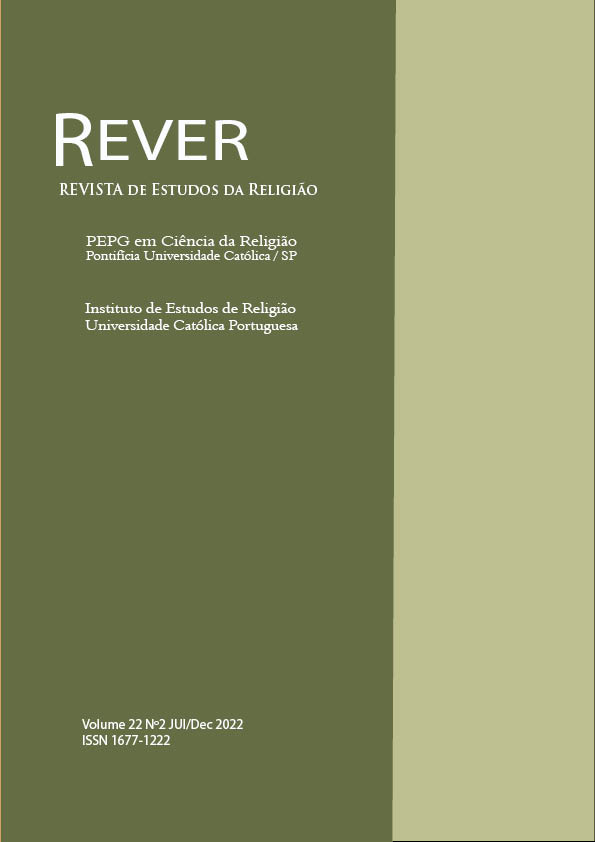Food and religion
The scholar of religion as a regulation and inspection agent for the production of food consumed by religious people
DOI:
https://doi.org/10.23925/1677-1222.2021vol22i2a5Keywords:
Food and religion, Food production, Applied study of religion, Professionalization of scholars of religionAbstract
Food and religion are two instances of human life that interact with each other through the constant attribution of meaning to what is not limited to the closure of a mere essential biological activity: the act of eating. The human being can attribute special meaning to things, institute rites, and give a transcendent dimension to everyday life, in addition to holding the competence of producing and formalizing specific practices and rites as a way of having a sacred experience. Such a framework favors going beyond the diversity of meaning of the cultural wealth already in the culinary universe. It is also about investing in food in a religious sense. It means considering the handling and use of food for ritual purposes and the expression of sacred things within a scope of criteria and precepts established by religions. In this horizon, the present approach considers the beginning of the proven relationship between food and religion to discuss how and why this relationship evokes the attention of the study of religion. As a result of our investigation, the need for qualified service in the food sector for religious people is defended. Therefore, it is important to bring to light the professional role to be played by scholars of religion in this specific food segment. Moreover, it is important to affirm, besides the academic universe, a field of professional activity to be widely explored and exercised by scholars of religion.
References
BARBOSA, Isabela. Entre o fogão e a ciência: a comida como objeto de estudo na construção da cultura. Inter-Legere, Natal, v. 2, n. 25, 2019. Disponível em: <https://periodicos.ufrn.br/in terlegere/article/view/17308>. Acesso em: 30 jul. 2022.
BOURDIEU, Pierre. O poder simbólico. Tradução de Fernando Tomaz. Rio de Janeiro: Bertrand Brasil, 1989.
CARNEIRO, Henrique. Comida e sociedade: uma história da alimentação. Rio de Janeiro: Campus, 2003.
CARVALHO, Maria Cláudia da Veiga Soares; LUZ, Madel Therezinha; PRADO, Shirley Donizete. Comer, alimentar e nutrir: categorias analíticas instrumentais no campo da pesquisa científica. Ciências & Saúde Coletiva, Rio de Janeiro, v. 16, n. 1, pp. 155-163, 2011. Disponível em: <http://www.scielo.br/pdf/csc/v16n1/v16n1a19.pdf>. Acesso em: 20 jan. 2020.
CASTRO, Janaína Josias de. Do ideal ao real: a coluna de salvação – agricultura e alimentação orgânica natural na Igreja Messiânica Mundial no Brasil (IMMB) – Johrei Center extensão Goiânia”. 156f. Dissertação (Mestrado em Ciências da Religião), Pontifícia Universidade Católica de Goiás, Goiânia, 2020.
CROATTO, José Serevino. As linguagens da experiência religiosa: uma introdução à fenomenologia da religião. Tradução de Carlos Maria Vasquez Gutierrez. São Paulo: Paulinas, 2001.
FARINHA, Maycon Jorge Ulisses Saraiva et al. A relação interdisciplinar entre religião, habitos alimentares e economia a partir de uma abordagem bibliométrica. Revista Espacios, Caracas, n. 12, v. 38, 2017. Disponível em: <https://www.revistaespacios.com/a17v38n12/ a17v38n12p01.pdf>. Acesso em: 30 jul. 2022.
MATTOS, Rafael da Silva; LUZ, Madel Therezinha. Sobrevivendo ao estigma da gordura: um estudo socioantropológico sobre obesidade. Physis: Revista de Saúde Coletiva, Rio de Janeiro, v. 19, n. 2, pp. 489-507, 2009. Disponível em: <http://www.scielo.br/pdf/physis/v19 n2/v19n2a14.pdf>. Acesso em: 20 jan. 2020.
MINTZ, Sidney W. Comida e antropologia: uma revisão. Revista de Ciências Sociais, São Paulo, n. 47, v. 16, pp. 31-42, 2001. Disponível em: <http://www.scielo.br/pdf/rbcsoc/v16n4 7/7718>. Acesso em: 25 jan. 2020.
OTTO, Rudolf. O sagrado. Lisboa: Edições 70, 1992.
RIBEIRO, Érika Neves; AMARAL, Larissa Maciel. Certificação Kosher como estratégia de acesso a novos mercados. Fortaleza, 2019. Disponível em: <https://www.academia.edu/4031 6332/CERTIFICA%C3%87%C3%83O_KOSHER_COMO_ESTRAT%C3%89GIA_DE_ACESSO_A_NOVOS_MERCADOS>. Acesso em: 28 jan. 2020.
SOUZA, Patrícia Rodrigues. A religião vai à mesa: uma degustação de religiões com suas práticas alimentares. São Paulo: Ed. Griot, 2015.
WIRZBA, Norman. Alimento e fé: uma teologia da alimentação. São Paulo: Loyola, 2014.
Downloads
Published
How to Cite
Issue
Section
License

This work is licensed under a Creative Commons Attribution-NonCommercial 4.0 International License.
Authors who publish in this journal agree with the following terms:- Authors retain copyright, but grant the journal the right of first publication, with the work simultaneously licensed under the Creative Commons BY-NC License.
- Authors are authorized to assume additional contracts separately, for non-exclusive distribution of the work published in this journal (e.g., publishing in an institutional repository or as a book chapter), as long as with acknowledgment of authorship and first publication in this journal.


